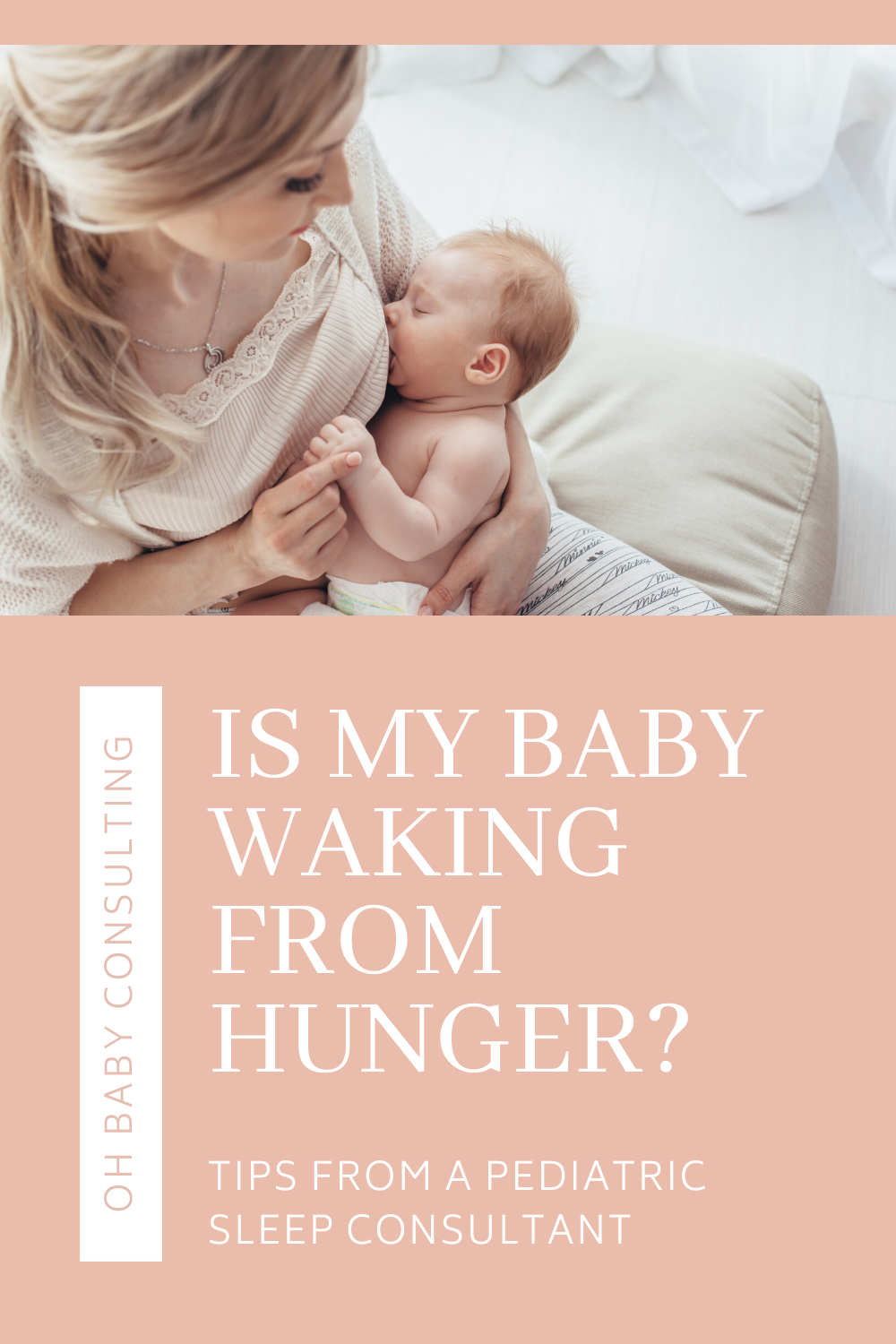Is My Baby Waking From Hunger?
A question that plagues every parent’s mind when they hear their baby wake up in the middle of the night is: are they hungry?
But the truth is, not all wake ups are hunger-based. Of course, when your baby is a newborn it is natural and expected that they will wake up to eat overnight every 3-4 hours. Their tummies are still quite tiny and they need to eat more frequently. But, barring any medical or growth issues, once your baby is no longer a newborn, has doubled their birth weight, and is overall healthy and gaining well, they may be waking up more frequently overnight than they actually need to eat.
But why?
Many children develop a dependency on eating, rocking, holding, bouncing, etc. in order to fall asleep at bedtime. If they are relying on something (or someone) to fall asleep at the beginning of the night, there is an increased likelihood that they are going to need those same interventions again in the middle of the night in between sleep cycles. A common response to a crying child in the middle of the night is to offer them a feed (which they may readily take, as I would absolutely take a slice of pizza at 2 a.m. if it would help me get back to sleep), but in reality, hunger may not actually be the root of the wake up.
If your child is waking up several times throughout the night, how can you know whether they are waking up out of true hunger or whether they just need a little help falling back to sleep? One solves the root of the wake up (“I wake because I’m hungry and a feed resolves that.”) and the other addresses a symptom but actually perpetuates wake ups (“I wake because I don’t know how to connect sleep cycles on my own and am responded to with a feed which does comfort me back to sleep because that’s how I fell asleep at bedtime.”)
Here are some things to consider if you’re wondering whether it’s time to say goodbye to (some or all) night feeds:
Is your child still a newborn?
It goes without saying (but I’ll say it again) it is normal and expected to feed a newborn multiple times overnight. Their tummies are small, they haven’t started solid food yet, and both formula and breast milk digest fairly quickly, so there’s a good chance that they’re going to need to eat every 3-4 hours overnight.
If your newborn has given you longer stretches in the past and you have the green light from your doctor, you can certainly encourage them to go back to sleep by using other intervention methods vs. resorting straight to feeding, but understand that 1-4 nighttime feeds (depending on age) can be normal during the newborn period.
Is your child eating enough during the day?
Once your child is biologically capable of sleeping through the night without a feed (please speak to your pediatrician about the most appropriate timing for your child), you need to make sure they’re getting the calories they need during their daytime awake hours. The amount required is going to vary from child to child and many will naturally eat more during the day as their nighttime calories decrease. If you want to bulk up their feedings more intentionally, you can add in an extra feeding during the day or tack on additional ounces to each bottle. As long as they are tolerating it well and you’re not seeing an uptick in spit up, you can continue with the larger/additional daytime feeds.
A quick but super important reminder: Before attempting to make any changes to your child’s feeding schedule, please talk to your pediatrician. Nighttime sleep is awesome, but calories are essential. If your little one is underweight or not growing as fast as they should be, it might not be a good time to wean off of night feedings
Is your child falling asleep quickly when you begin feeding them overnight?
If your child is falling asleep quickly into their nighttime feeding, chances are they aren’t actually looking for the calories and instead looking for the comfort. Babies who are genuinely hungry will usually eat until they’re full, whereas those who are feeding for comfort tend to drift off pretty quickly once they’ve gotten a dose of that assistance that they were looking for.
Note: this is not the case for every baby. Many babies will take full feeds each time they wake up at night and as a result, may struggle to consume age-appropriate, adequate calories during the day. This is a phenomenon known as “reverse-cycling” where baby is taking in the bulk of their calories overnight vs. during the daytime.
Does your child sleep for a nice long stretch after feeding?
If your child does take a full feed at night, they should be able to sleep for at least 3-4 hours afterward. If they are older than 4-5 months (and healthy, gaining weight well, etc.) we’d expect them to be able to go much longer stretches (upwards of 6-9 hours). Waking up more frequently is likely a symptom of looking for help back to sleep vs. true hunger.
Does your child fall asleep independently?
Here’s the key question. The cornerstone of the whole equation. Can your child fall asleep on their own?
Children who have independent sleep skills are much better able to connect sleep cycles in the middle of the night vs. waking in need of assistance getting back to sleep. In fact, parents I’ve worked with tell me all the time what peace of mind they have knowing that when their little one cries out in the middle of the night, they feel more confident in how to respond.
Determining whether your child is hungry at night is obviously a complicated situation and you can use this blog post and this checklist to help you determine if your baby is waking for hunger or comfort. Calories are vital but so is sleep, so we often end up paralyzed trying to balance the importance of the two. This tightrope is immeasurably easier to walk once you’ve taught your baby the skills they need to fall asleep on their own. Once the habit of feeding or otherwise assisting to sleep is broken, you can feel much more confident that their requests for a nighttime feed are out of necessity and not just your child being stuck between sleep cycles and looking for help back to sleep.
And of course, if you’re looking for some help teaching your children those independent sleep skills, 1:1 coaching can help!
If you’re exhausted, totally overwhelmed by your child’s sleep habits, or looking for answers to the sleep questions that keep you up at night (literally), then you’ve come to the right place. I’m Jamie, founder of Oh Baby Consulting, and my goal is to help your family get the sleep you need to not just survive, but thrive!

